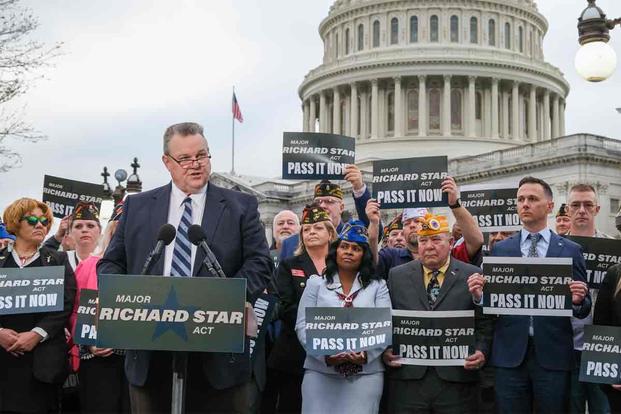Leading lawmakers and veterans groups are renewing their push for a bill that would dramatically expand benefits for veterans injured in combat.
The Major Richard Star Act, as the bill is called, would ensure all service members who medically retire have full access to both military retirement pay and Department of Veterans Affairs disability benefits. The bill had some momentum last year but has since stalled.
But veterans service organizations on Capitol Hill this week and lawmakers from both parties who are sponsoring the bill are now vowing to keep fighting until the bill crosses the finish line.
Read Next: Top Marine Returns to Full Duty Status as Commandant After Cardiac Arrest Last Year
"We're not going to stop until we fix this injustice for our veterans and their loved ones," Senate Veterans Affairs Committee Chairman Jon Tester, D-Mont., said at a news conference Tuesday afternoon alongside a throng of veterans.
"I know that the VSOs and the veteran community can come together, and they can help us get this done," Tester added. "We saw it with the PACT Act. We saw veterans step up and make a big difference and actually, the truth is, got the bill passed in the United States Senate. We're going to have to do it again with the Major Richard Star Act."
Right now, veterans with fewer than 20 years of service and a disability rating of less than 50% have their retirement pay reduced by a dollar for every dollar of disability pay they get.
Those rules mean an estimated 50,000 retirees are ineligible for concurrent benefits. The average offset was about $1,900 per month in 2022, according to the Congressional Budget Office.
The Major Richard Star Act would remove those restrictions so that all retirees with combat-related disabilities can collect their full retirement and disability benefits.
The bill's namesake was an Iraq and Afghanistan veteran who was forced to retire before 20 years of service after he was diagnosed with lung cancer he developed following burn pit exposure. Star died from cancer in 2021.
"By far, Richard's greatest goal was to pass this," his widow, Tonya Star, said at Tuesday's news conference. "These men and women earned their retirements the hard way, and Richard made myself, along with many of you, promise that we would not stop until we got this done. It hasn't been an easy road to travel. I know many of you, like myself, were in offices today advocating for this bill. I cannot thank you enough for all of your support. We are closer than we have ever been. We're going to get it done this year."
The news conference was held ahead of Wednesday's start of the House and Senate Veterans Affairs committees' annual veterans service organizations hearings, where the groups were expected to advocate for the bill. Veterans groups also held private meetings with several congressional offices Tuesday to lobby for the bill.
The bill, which falls under the jurisdiction of both the Veterans Affairs and Armed Services committees, was advanced out of the House Armed Services Committee last year. It has also garnered more than 320 co-sponsors in the House and more than 70 in the Senate.
Despite the broad bipartisan support, there has been no movement on the bill since the House committee vote amid questions about how it would be paid for. The Congressional Budget Office has projected the legislation could cost an estimated $9.75 billion in what's known as mandatory spending over the next decade.
But supporters of the bill argue the country owes the benefits to its veterans, regardless of cost. Supporters said they are hoping to get the legislation attached to the annual defense policy bill that will move through Congress later this year and, if that doesn't work, look for any other legislative vehicle they can find.
"We're not going to rest until we pass the Richard Star Act," Rep. Gus Bilirakis, R-Fla., the lead House sponsor, said at the news conference. "This is a righteous cause."
Related: Lawmakers Advance Bill to Let Disabled Vets Collect Full Benefits, But Hurdles to Passage Remain













